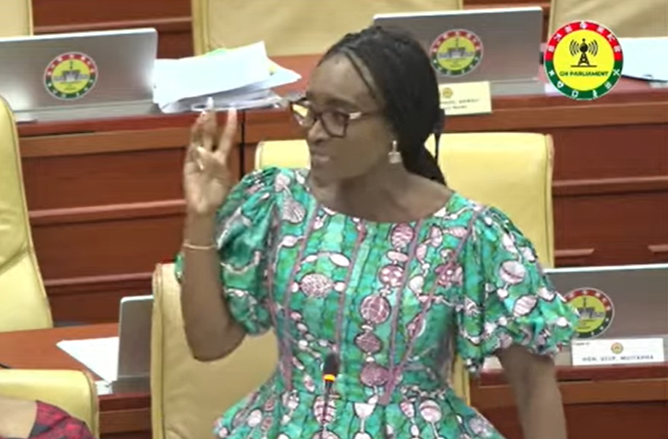Former Deputy Finance Minister and Member of Parliament for Atiwa East, Abena Osei Asare, has criticised the Mid-Year Budget Review presented by Finance Minister Dr. Cassiel Ato Forson, arguing that the figures do not reflect the economic realities faced by ordinary Ghanaians.
“Ghanaians don’t live in the budget. They live in the economy,” she declared.
Also Read: Mid-Year Budget nothing but ‘propaganda piece’ – Amin Adam slams Finance Minister
She acknowledged that the minister cited improvements such as a drop in inflation from 23.8% to 13.7% and a reduction in public debt from GH¢737 billion to GH¢613 billion. However, she argued these figures have not translated into tangible relief for the average Ghanaian.
“They look in their pockets, they check their shopping baskets, their electricity and utility bills—and they don’t feel the relief the minister is talking about,” she added.
The former Deputy Minister challenged the Minister’s claim of fiscal discipline, asserting that the drop in public debt was due more to the appreciation of the cedi than to sound economic management.
“If the cedi appreciates and debt appears lower in cedi terms, that’s not an achievement worthy of applause,” she said.
She stressed what she called inconsistencies in the government’s interest payment figures, noting that while domestic interest was said to have decreased, external interest payments had risen by GH¢1 billion, a contradiction she described as very artificial.
Hon. Osei Asare also questioned the government’s claim of spending in the right places, describing the capital expenditure performance as disappointing.
“You budgeted GH¢32 billion for capital expenditure and, seven months in, you’ve spent just GH¢7.1 billion. Contractors are crying, infrastructure is crumbling, and you claim you’re spending in the right places?”
She revealed that Ministries, Departments, and Agencies (MDAs) had received only about one-third of their allocated goods and services budgets.
“How are they working under such constraints?” she asked.
The Atiwa East MP accused the Finance Minister of manipulating revenue projections to create the appearance of success. Citing the GH¢1 fuel tax dubbed D-Levy, she reminded Parliament that the measure was projected to raise GH¢5.7 billion annually, yet had only generated GH¢1.1 billion halfway through the year.
She also pointed to contradictions in the government’s food policy. While the Minister claimed efforts were underway to reduce food prices, she noted that new transport measures would lead to increased costs.
“On one hand, you say you’re increasing food production. On the other hand, you’re introducing policies that raise transport fares by 30–40%. That’s a clear policy disconnect,” she asserted.
Hon. Osei Asare urged the Finance Minister to take concrete steps toward reforming the economy, including restructuring the energy sector with clear Key Performance Indicators (KPIs), overhauling the revenue collection system to reduce human intervention, and sanctioning anyone who breaches the Public Financial Management (PFM) Act.
She also expressed concern over the lack of adjustments to statutory funds such as GETFund, NHIA, and DACF, despite the revised revenue increase.
“If you add GH¢2 billion to total revenue, it must reflect in statutory funds too. Otherwise, you are shortchanging them,” she cautioned.
Hon. Osei Asare reminded the government that Ghanaians gave them a political mandate for real, measurable outcomes, not empty rhetoric. “Ghanaians gave you political capital in the last election. Use it to benefit them, not to churn out numbers that don’t change lives,” she said.


